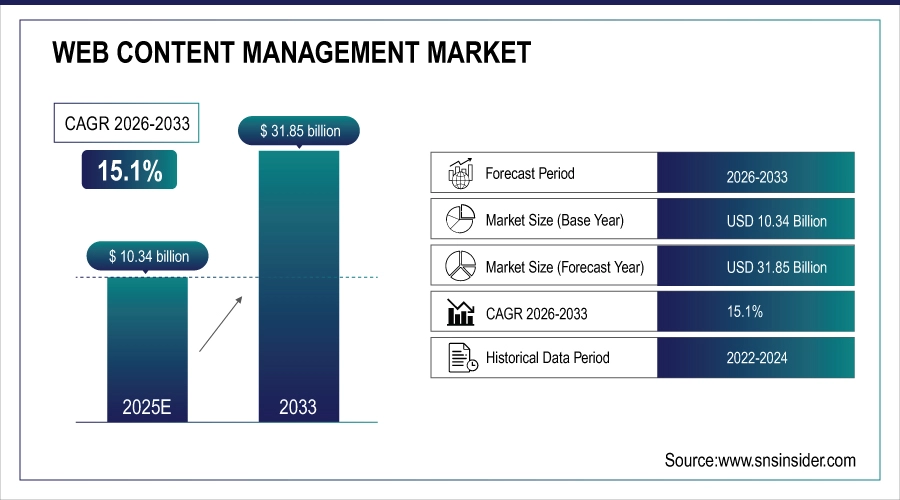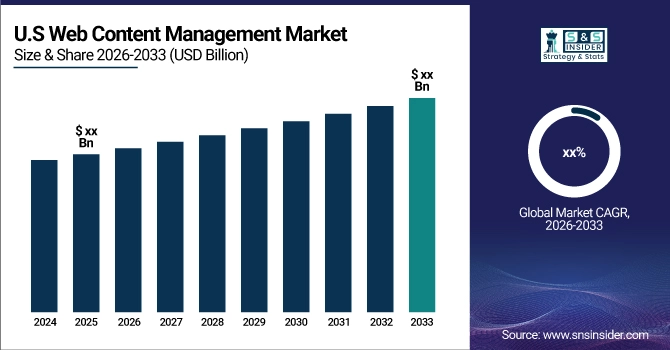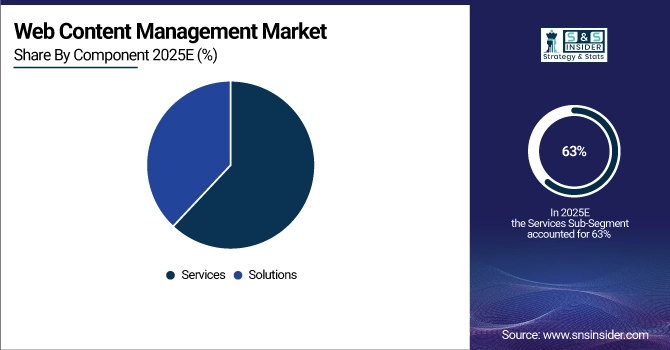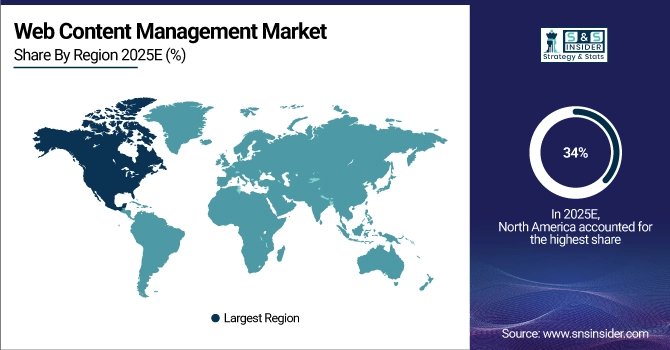Web Content Management Market Report Scope & Overview:
The Web Content Management Market was valued at USD 10.34 billion in 2025E and is expected to reach USD 31.85 billion by 2033, growing at a CAGR of 15.1% from 2026-2033.
The Web Content Management Market is growing due to increasing demand for seamless digital experiences, rising adoption of cloud-based CMS solutions, and the need for personalized, omnichannel content delivery. Businesses are focusing on enhancing customer engagement, improving operational efficiency, and enabling real-time content updates. Additionally, growing e-commerce, digital marketing, and mobile device usage are driving investments in robust content management platforms that support scalability, security, and integration with AI and analytics tools, further fueling market expansion globally.
Web Content Management Market Size and Forecast
-
Market Size in 2025E: USD 10.34 Billion
-
Market Size by 2033: USD 31.85 Billion
-
CAGR: 15.1% from 2026 to 2033
-
Base Year: 2025E
-
Forecast Period: 2026–2033
-
Historical Data: 2022–2024

To Get More Information on Web Content Management Market - Request Sample Report
Web Content Management Market Trends
-
Rising demand for dynamic, personalized, and omnichannel digital experiences is driving the web content management (WCM) market.
-
Growing adoption of cloud-based WCM platforms is enhancing scalability, collaboration, and remote content delivery.
-
Expansion across e-commerce, media, BFSI, and healthcare sectors is boosting market growth.
-
Integration with AI, analytics, and marketing automation tools is improving content optimization and customer engagement.
-
Increasing focus on regulatory compliance, data security, and content governance is shaping adoption trends.
-
Advancements in headless CMS, mobile-first design, and omnichannel publishing are enhancing platform capabilities.
-
Collaborations between software vendors, digital agencies, and enterprises are accelerating innovation and global deployment.

Web Content Management Market Growth Drivers:
-
Rising Adoption of Digital Transformation Across Industries Fuels the Growth of the Web Content Management Market
The increasing shift towards digital transformation across various industries is one of the major drivers for the Web Content Management (WCM) market. As organizations embrace digital technologies to transform customer experiences and drive operational efficiency to innovative products and services, Web Content Management systems have become the cornerstone of digital content management. Organizations require multi-channel platforms that will allow smooth creation, optimization, and distribution of content. This is very prevalent in all sectors such as retail, health care, banking, and education to stay competitive in consumer demands.
Web Content Management Market Restraints:
-
High Initial Cost and Complexity of Implementing Web Content Management Systems Restricts Market Growth
The high initial cost and complexity of implementing Web Content Management (WCM) systems can act as a restraint on market growth. The financial and technical resources required to deploy Web Content Management solutions often make it challenging for small and medium-sized enterprises. Integrating these systems with existing infrastructure and ensuring compatibility with multiple content platforms can be complicated and costly. Additionally, maintaining Web Content Management platforms and training employees on their usage adds to the operational costs. Because of this, some companies may be slow in embracing adoption or opt for cheap alternatives, limiting market coverage.
Web Content Management Market Opportunities:
-
Integration of Artificial Intelligence and Automation in Web Content Management Offers Significant Growth Opportunities
The integration of Artificial Intelligence (AI) and automation within Web Content Management (WCM) platforms presents a significant opportunity for market growth. AI-powered tools would automate content creation, management, and personalization, thus offering businesses the means to provide better customer experiences based on relevance and engagement. Improved SEO, better content recommendations, and user behavior analytics are more efficient ways in which content will be delivered by automation in Web Content Management: faster updates and real-time insights into data operation overhead. In addition, because there is now a broadening sense of the need to address personalized and dynamic content further, it emphasizes the importance of integrating AI and automation in Web Content Management systems.
Web Content Management Market Challenge:
-
Data Privacy and Security Concerns in Web Content Management Systems Pose a Major Challenge to Market Growth
Data privacy and security concerns are a major challenge facing the Web Content Management (WCM) market. Security becomes more of a concern as the business handles vast amounts of customer information, including personal data. If WCM systems violate data protection regulations, such as GDPR, or do not protect sensitive data, huge risks can be posed to organizations due to data breaches, legal penalties, and damage to their reputation. Consequently, companies have to invest heavily in securing their content management systems, which incurs costs and complexity to them. Ensuring that the data are highly secure yet still private is one of the greatest challenges facing WCM providers and adopters.
Web Content Management Market Segments Analysis
By Component, Services dominated the Web Content Management Market, while the Solutions segment is expected to grow at the fastest CAGR
In 2025, the Services segment of the Web Content Management (WCM) market accounted for 63% of the revenue, highlighting its critical role in supporting businesses with content management strategies, implementation, and integration. This dominance reflects the growing need for tailored solutions in deploying WCM systems effectively.
The Solutions segment in the Web Content Management market is projected to grow at the largest CAGR of 16.03% during the forecast period, driven by increasing demand for scalable, flexible, and feature-rich content management platforms. Driving the segment's growth and enhancing WCM’s capabilities in delivering dynamic digital experiences.

By Deployment Type, Cloud-based WCM led the market and is projected to grow at the fastest rate
The Cloud-based segment dominated the Web Content Management (WCM) market in 2025, accounting for 63% of the total revenue and is expected to grow the fastest during the forecasted period. Cloud-based WCM solutions offer scalability, flexibility, and cost-effectiveness, allowing businesses to manage content across multiple channels seamlessly. The cloud trend in WCM reflects similar developments in the broader tech market, offering efficient, scalable solutions for growing demand in digital infrastructure across industries.
By Organization Size, Large Enterprises held the largest market share, while SMEs are expected to grow at the fastest CAGR
The Large Enterprises segment held the largest revenue share of 64% in 2025, driven by the increasing demand for advanced Web Content Management (WCM) systems. Large companies such as IBM and Microsoft have launched enterprise-grade WCM solutions tailored to manage complex, multi-channel content strategies. The demand from large enterprises mirrors trends in the broader tech market, where scalability and robustness are crucial for meeting evolving customer demands in a digital-first world.
The Small and Medium Enterprises (SMEs) segment is expected to grow at the largest CAGR of 15.67% during the forecasted period. As these businesses increasingly prioritize digital presence, they seek affordable and scalable WCM solutions. The growing adoption of cost-effective WCM systems reflects the broader trend of digital transformation across SMEs, boosting their competitiveness in the digital space.
By Vertical, Media & Entertainment dominated the market, with the Retail segment projected to grow at the highest CAGR
The Media and Entertainment segment led the Web Content Management (WCM) market with the largest revenue share of 25% in 2025. The demand for fast, dynamic content delivery in this vertical is similar to trends in the tech market, where real-time, multi-platform content management is crucial for user engagement.
The Retail segment is projected to grow at the highest CAGR of 16.85% during the forecasted period. Retailers are increasingly adopting WCM solutions to create personalized and engaging online experiences. The growth in retail WCM adoption aligns with the broader trend of digital transformation across industries, enhancing customer engagement and sales.
Web Content Management Market Regional Analysis
North America Web Content Management Market Insights
In 2025, the North America region dominated the Web Content Management (WCM) market, holding a significant share of around 34%. These organizations in this region are continually investing in AI-driven WCM solutions to upscale customer engagement and operational efficiency.

Do You Need any Customization Research on Web Content Management Market - Enquire Now
Asia Pacific Web Content Management Market Insights
The Asia Pacific region is the fastest-growing market for Web Content Management, with an estimated CAGR of 16.87% during the forecast period. This transformation of digital has caused a rise in demand for WCM solutions within countries like China, India, and Japan, especially among retailers, media industries, and manufacturers. Businesses opt for WCM platforms for improved content strategy and user experience to expand their online presence. For example, Alibaba and Rakuten are leveraging WCM solutions to manage dynamic content across their e-commerce platforms.
Europe Web Content Management Market Insights
The Europe Web Content Management Market is witnessing significant growth driven by rapid digital transformation across enterprises, increased adoption of cloud-based CMS solutions, and the rising need for personalized, omnichannel customer experiences. Organizations are leveraging advanced platforms to streamline content creation, management, and delivery while enhancing engagement and brand presence. Growing e-commerce, regulatory compliance requirements, and integration with AI, analytics, and marketing automation tools further bolster market expansion across key European countries.
Middle East & Africa and Latin America Web Content Management Market Insights
The Middle East & Africa and Latin America Web Content Management Market is expanding due to rising digitalization, increasing internet penetration, and growing adoption of cloud-based CMS solutions. Businesses are focusing on enhancing customer engagement through personalized, omnichannel content experiences. Additionally, the surge in e-commerce, digital marketing initiatives, and demand for efficient content management platforms that integrate with analytics, AI, and marketing automation tools is driving robust market growth across these regions.
Web Content Management Market Competitive Landscape:
Adobe
Adobe is a global leader in digital experience management, offering Adobe Experience Manager (AEM) for AI-driven content creation, publishing, and personalization. Its platforms integrate assets, generative AI, and automation to streamline content workflows across web and digital channels. Adobe enables enterprises to deliver predictive, data-informed experiences with high-speed content delivery and personalization. The combination of AEM Sites, Content Hub, and Adobe Firefly allows organizations to optimize digital engagement and improve efficiency across creative and marketing teams.
-
2025 – Adobe Experience Manager Sites expands AI-powered CMS capabilities at Adobe Summit, enabling predictive content creation and continuous experience optimization across web channels.
-
2024 – Adobe Content Hub with AEM Assets launched, integrating assets and generative AI to streamline content search, editing, remixing, and distribution.
-
2023 – Adobe reimagined AEM for web publishing, offering simplified content creation via Word/Google Docs plus AI insights and Firefly integration for personalized delivery.
OpenText
OpenText provides enterprise content management and intelligent content services across cloud and hybrid environments. Its Core Content Management and Content Cloud platforms combine AI-driven assistants, secure collaboration, and advanced workflow automation to optimize content lifecycles. OpenText integrates with enterprise systems like SAP and Outlook to enhance productivity, governance, and insights. Recognized as a leader in content platforms, OpenText helps organizations scale content operations, improve automation, and enable AI-assisted decision-making across distributed teams.
-
2025 – OpenText Core Content Management 25.4 adds AI assistants, workflow enhancements, and SAP/Outlook integration for improved content lifecycle management.
-
2025 – OpenText Content Cloud emphasized AI readiness and secure content collaboration at OpenText World 2025.
Microsoft
Microsoft offers SharePoint as a core solution for enterprise content management and digital collaboration. Integrated with Microsoft 365 Copilot, SharePoint now incorporates AI-assisted content creation, publishing, and navigation tools for intranet and public web platforms. Microsoft emphasizes AI-enabled workflow automation, content lifecycle management, and enhanced productivity across organizations. SharePoint remains central to Microsoft’s content ecosystem, supporting secure, scalable, and collaborative web content solutions while enabling enterprises to manage information efficiently across digital channels.
-
2025 – Microsoft 365 Copilot supports AI-assisted SharePoint page creation and content management, accelerating web content authoring.
-
2024 – Microsoft summarized SharePoint content management advances during 2024, highlighting AI enhancements for web publishing.
-
2023 – Microsoft Learn highlighted SharePoint’s web content management features, including publishing and navigation tools for intranet and public sites.
Key Players
Some of the Web Content Management Market Companies
-
Adobe
-
OpenText
-
Microsoft
-
Automattic
-
Canva
-
RWS
-
Progress
-
HubSpot
-
Yext
-
Upland Software
-
HCL Technologies
-
Optimizely
-
Bloomreach
-
Sitecore
-
Kentico
-
Crownpeak
-
Contentful
| Report Attributes | Details |
|---|---|
| Market Size in 2025 | US$ 10.34 Billion |
| Market Size by 2033 | US$ 31.85 Billion |
| CAGR | CAGR of 15.1 % From 2026 to 2033 |
| Base Year | 2025 |
| Forecast Period | 2026-2033 |
| Historical Data | 2022-2024 |
| Report Scope & Coverage | Market Size, Segments Analysis, Competitive Landscape, Regional Analysis, DROC & SWOT Analysis, Forecast Outlook |
| Key Segments | • By Component (Solutions, Services) • By Deployment Type (On-premises, Cloud-based) • By Organization Size (Large Enterprises, Small and Medium Enterprises) • By Vertical (BFSI, IT and Telecom, Retail, Education, Government, Healthcare, Media and Entertainment, Travel and Hospitality, Others) |
| Regional Analysis/Coverage | North America (US, Canada, Mexico), Europe (Eastern Europe [Poland, Romania, Hungary, Turkey, Rest of Eastern Europe] Western Europe] Germany, France, UK, Italy, Spain, Netherlands, Switzerland, Austria, Rest of Western Europe]), Asia Pacific (China, India, Japan, South Korea, Vietnam, Singapore, Australia, Rest of Asia Pacific), Middle East & Africa (Middle East [UAE, Egypt, Saudi Arabia, Qatar, Rest of Middle East], Africa [Nigeria, South Africa, Rest of Africa], Latin America (Brazil, Argentina, Colombia, Rest of Latin America) |
| Company Profiles | Adobe, OpenText, Microsoft, Oracle, Automattic, OpenAI, Canva, RWS, Progress, HubSpot, Yext, Upland Software, HCL Technologies, Acquia, Optimizely, Bloomreach, Sitecore |

